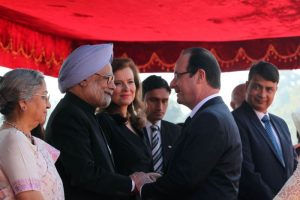French Foreign Policy in South Asia: NATO’s Bridge to India?
- Jun 28, 2013
- 3 min read
Updated: May 30, 2020
By Arthur Chan, Transatlantic Security Analyst

Speak to French officials about the role they envision for their country in the world, and there is a familiar refrain among them. Words like “autonomous” or “non-aligned” continue to find their way into conversations, even after the 2009 decision to return France to NATO’s integrated command. Serving officials from President Hollande himself and Foreign Minister Laurent Fabius to the French ambassador to NATO, Philippe Errera, continue to stress France’s autonomy from the Alliance. Others – such as Jean-David Levitte, Sarkozy’s former diplomatic counselor – have spoken at length of France’s capacity to independently exercise leadership on the world stage or, indeed, act as leader of the free world in place of an ailing United States. These long-held views are reaffirmed in France’s latest white paper on defense and national security.
Given this strategic mindset, French President Francois Hollande’s state visit to India in February can be seen as an attempt to bolster France’s global standing and exports. After all, the visit focused exclusively on strengthening bilateral commercial and defense ties, and provided some extra encouragement on a deal to sell 126 Rafale fighter jets to New Delhi. But in the context of this deepening relationship, France has a historic opportunity to go further – to strengthen NATO’s relationship with India, which would advance the interests of India, France, and the Alliance.
While NATO and India have cooperated on combating piracy through efforts like Operation Ocean Shield, New Delhi’s attention is drawn toward the Pacific in keeping with its Look East Policy. This is perhaps the reason why India has drawn closer to the U.S. and Japan while remaining aloof from NATO. The former two are Pacific powers, while the latter is not. More than that, Indian policymakers may believe that partnerships with the U.S. and Japan are more befitting of India’s stature, given the size and influence of these two countries. This could explain why, in spite high profile calls to forge a partnership and even offers of missile defense cooperation, little has come about as a result.
Yet this position may not be immutable. Back in 2008, Arvind Gupta, writing for the New Delhi-based think tank, the Institute for Defence Studies and Analyses, noted that NATO was on India’s doorsteps and seemed to be there to stay. Because of this, he urged dialogue between the two. Now, NATO combat troops are due to withdraw from Afghanistan by the end of 2014, but a smaller contingent of forces will remain to advise the Afghan army. Washington and Kabul are also still discussing a bilateral treaty to maintain a troop presence. Meanwhile, China has been increasingly active in Afghanistan, doing business with Hamid Karzai’s government while still talking to the Taliban. The foreign policy rivalry between China and India is well known, and the former’s growing presence in India’s neighborhood will surely raise alarm bells. Policymakers in New Delhi may be more open to the idea of dialogue with NATO now, if only to hedge against Chinese influence in South Asia.
In this context, France should work in cooperation with NATO and other member states to establish stronger relations with the world’s most populous democracy. The fact remains that France and NATO share a deep interest in the security of South Asia and the Indian Ocean, and their ties with India need not be mutually exclusive. Even as French, U.S., and other companies compete in a growing Indian market, NATO can strengthen the security of the region through cooperation with India on maritime security, missile defense, WMD proliferation, and other common challenges – to the clear benefit of France and the Alliance as a whole. At a time of strained defense budgets and intensifying threats, France has an opportunity to bridge NATO and India by encouraging more common projects.




Comments